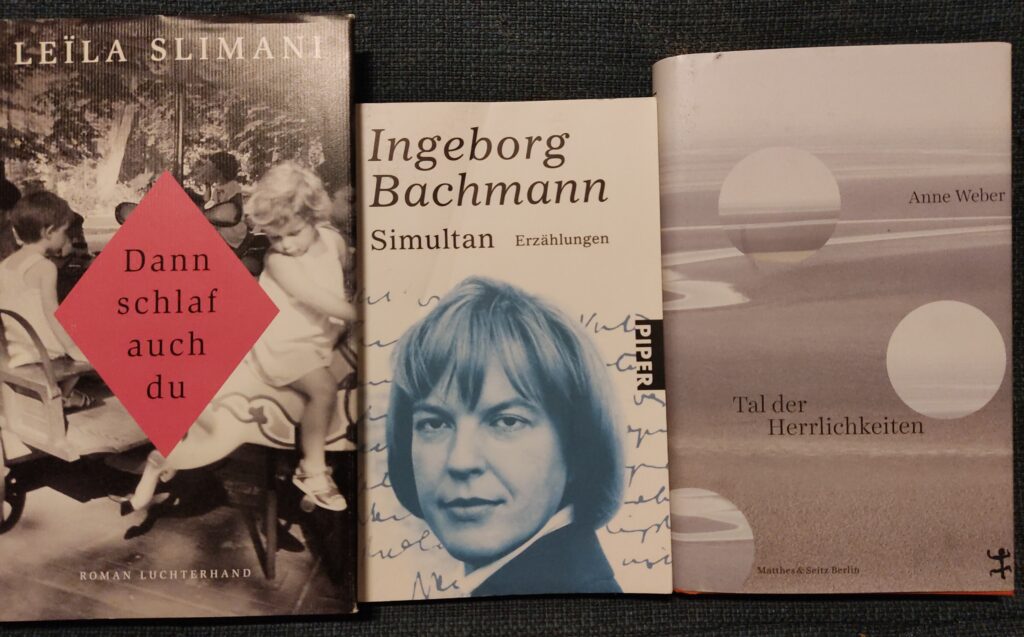I finished nine books in January, five by women/POC, and a below-target three in German (I’ve been listening to the very chunky Die Katze und der General, hopefully to be finished in February). This was a French month (six of the nine), to start off my 2023 read of Proust in suitable style.

- Getting Lost — Annie Ernaux tr. Alison L. Strayer
- Numa Roumestan — Alphonse Daudet tr. Charles de Kay
- Simultan — Ingeborg Bachmann
- In the Kitchen with Alain Passard — Christophe Blain tr. Elizabeth Bell
- The Way by Swann’s — Marcel Proust tr. Lydia Davis
- Tal der Herrlichkeiten — Anne Weber
- Dann schlaf auch du — Leïla Slimani tr. Amelie Thoma
- A Game of Snakes and Ladders — Doris Langley Moore
- Light Rains Sometimes Fall — Lev Parikian
Getting Lost is probably not the best place to start with Ernaux — much of the interest for me was that I’m already invested in her as a character in her other works, so it was fascinating to see the “real” her in her diary. Ernaux herself seems to be determined to make the relationship as dramatic as possible (“I write my love stories, and live my books”), almost as a piece of performance art.
Numa Roumestan was quite interesting, though it didn’t fill me with an urgent desire for more Daudet. The differences between northern and southern France are given a broad-brush/prejudiced treatment (“showing that loosened look of the face and revealing in the corners of the eyes and the mouth a character at once weak and violent—all the passions and nothing to resist them. Faces down south are like the Southern landscape.”), but the scheming peasant sister was at least entertaining.
Graphic novel of the month was In the Kitchen with Alain Passard — a graphic novel in some very loose sense, it’s essentially an extended interview with Passard and his staff, in comic form, interspersed with the chef’s recipes. Very odd, but enjoyable, especially the detours to the different farms where he grows vegetables for his restaurant. Most of the recipes (and Passard’s cooking in general) focus on vegetables rather than meat, so some could actually be attempted.
I liked Dann schlaf auch du much more than I’d expected; the story starts at the end, so the interest is not in where we’re going, but how we get there. Along the way, the economic and racial injustices in contemporary France are neatly skewered, sometimes subtly (as in the French-Moroccan mother’s non-reaction to her friends’ racism), other times more broadly.
I’m planning to reread Proust over the course of the year, and loved Lydia Davis’s translation of The Way by Swann’s. Details and particularly good/weird bits in my two Mastodon threads: https://mastodon.green/@slnieckar/109693054146687675 and https://mastodon.green/@slnieckar/109757037221321445 .
One last mostly-French book: Tal der Herrlichkeiten is by the German-French writer Anne Weber, who produces her books in both languages. A mythic story set in contemporary France, the two elements complement each other brilliantly — the sometimes shocking and fantastic elements lend weight, and the realism of the modern setting brings verisimilitude.
Simultan is another one which I hadn’t expected to like so much (I have memories of Malina being a slog). It reminded me of Eva Menasse’s Tiere Für Fortgeschrittene, with mostly longish stories focusing on relationships.
I read A Game of Snakes and Ladders for a reading group which now isn’t happening this month at least, but I’m glad I was spurred to read one I normally wouldn’t. The setting of interwar Egypt is intriguing; the racial attitudes of the characters are obviously suspect (dirty Arabs, covetous Jews etc.), and I’m less than confident about the author’s own position, but that’s something which that discussion might address if the time comes.
Finally, I’ve spent the last year reading Light Rains Sometimes Fall one micro-season at a time. We’ve been exploring our local patch at the same time as reading about his, and it’s been great to compare the two as the year has progressed (“The act of noticing, once undertaken, makes you realise how little of your life you’ve spent looking – really looking”). I’m very jealous of his peregrines and dunnocks. There are good jokes:
You’ll see crows with chips in their beaks; you might also see them dropping molluscs or nuts from a great height to smash them open. You wouldn’t bet against them perpetrating a basic phishing scam against the elderly.
Fun writing:
She is there, on the nest. A minute’s looking and I find the father, up and to the left, alertness birdified.
Even the sight of one swift squiggling around high above the house like an excitable parenthesis has me craning my neck to watch.
Ways to see:
The mind wanders, thinks odd, disturbing, circular thoughts. To keep it on the straight and narrow I set it little tasks, observational homework. Go for a walk and look for square things. Or smooth things. Or green things.
And much to empathise with:
I’m familiar with scattery movements. They’re the bane of my life. Because once you’ve seen one you’re obliged by the laws of nature-watching to see where it takes you, and where it takes you is often peering into a mass of foliage, waiting for it to repeat itself.
